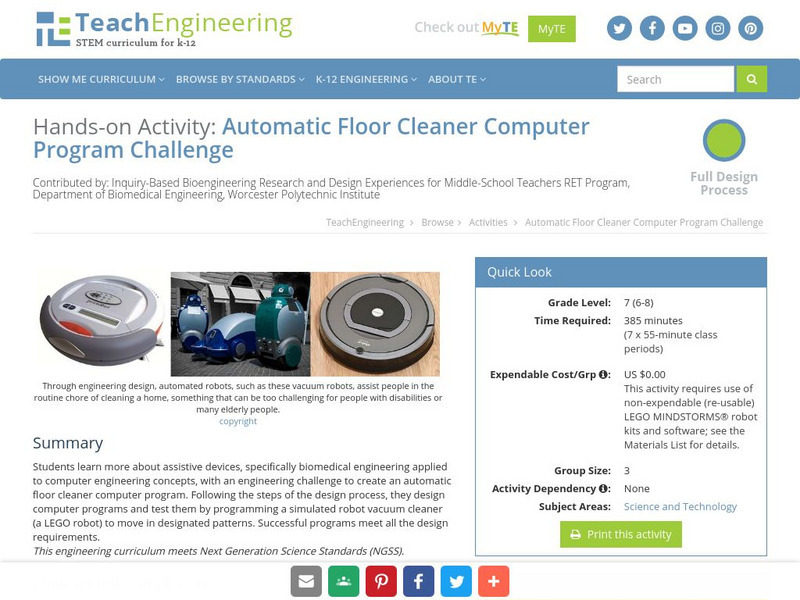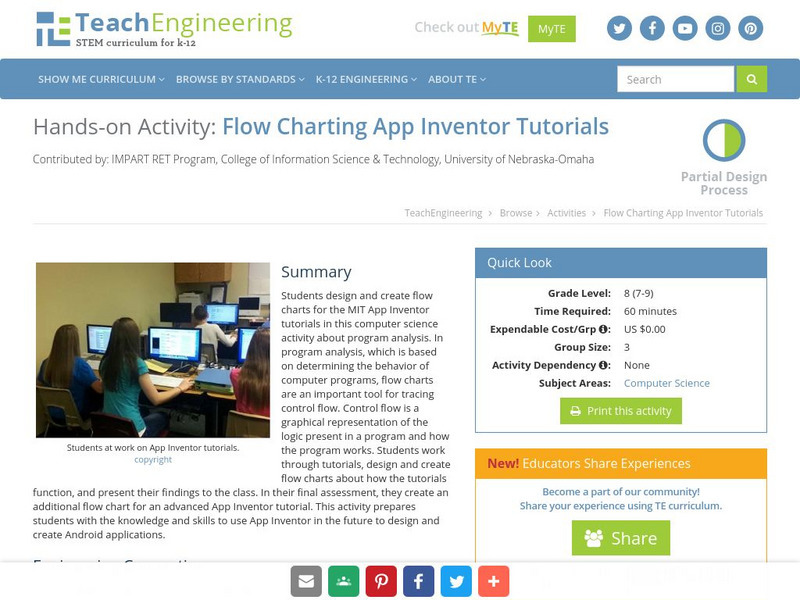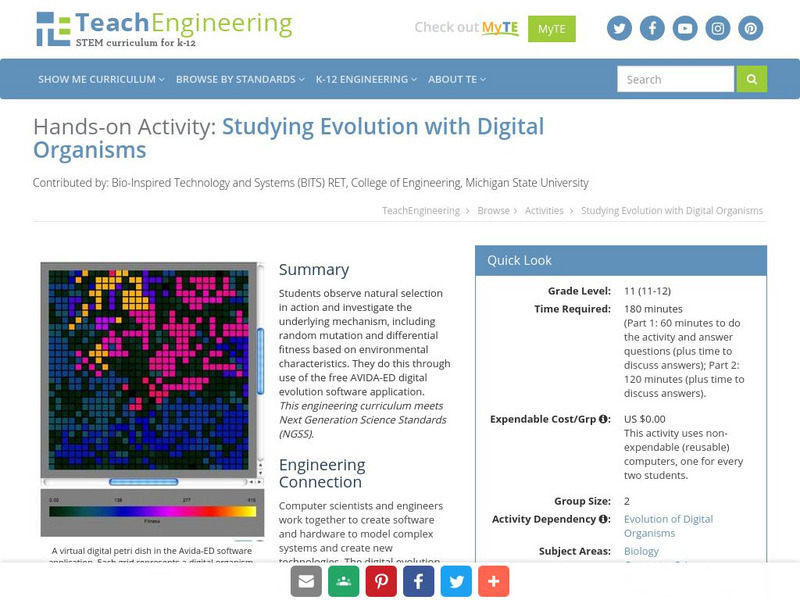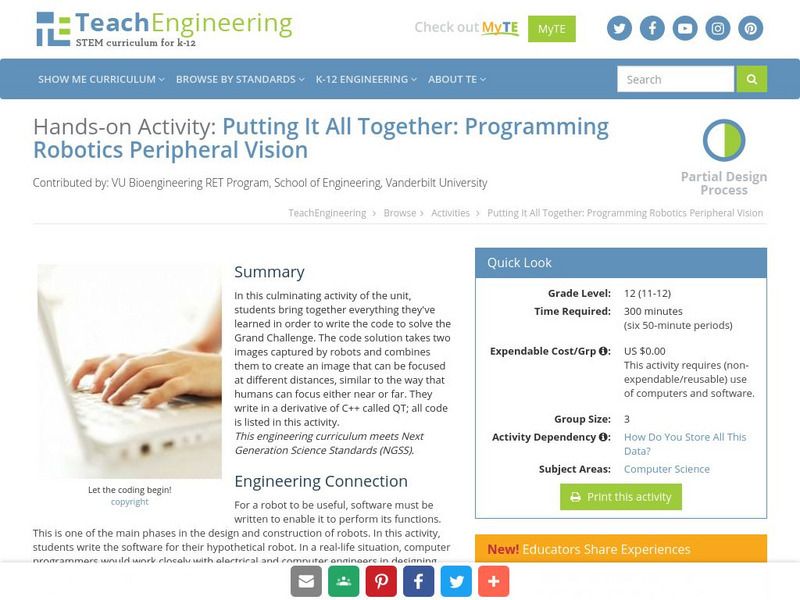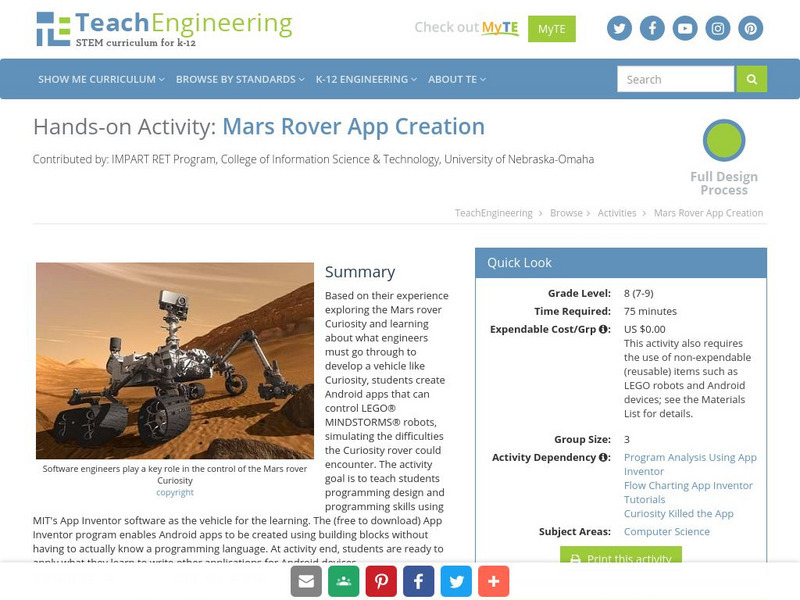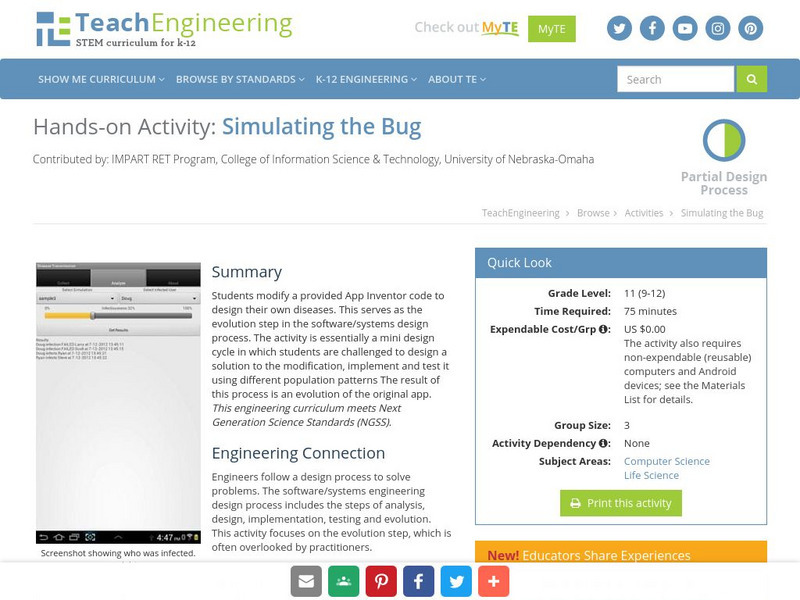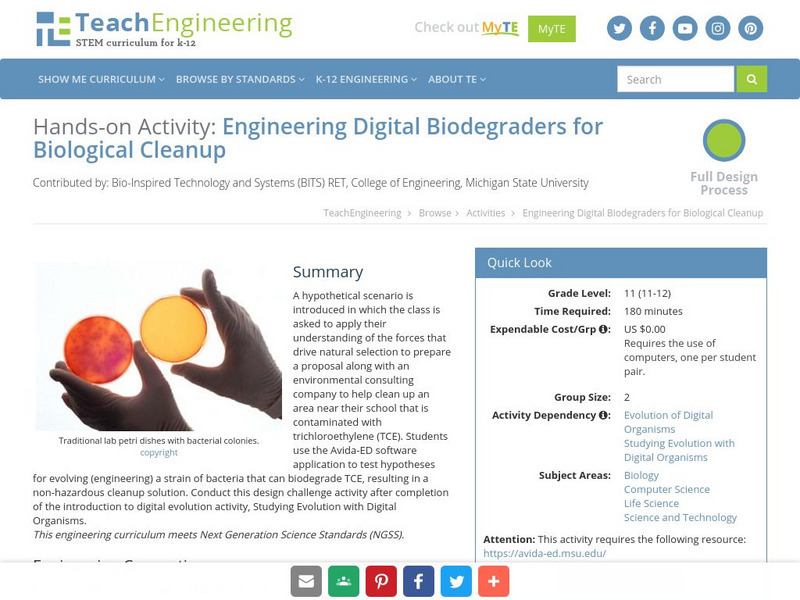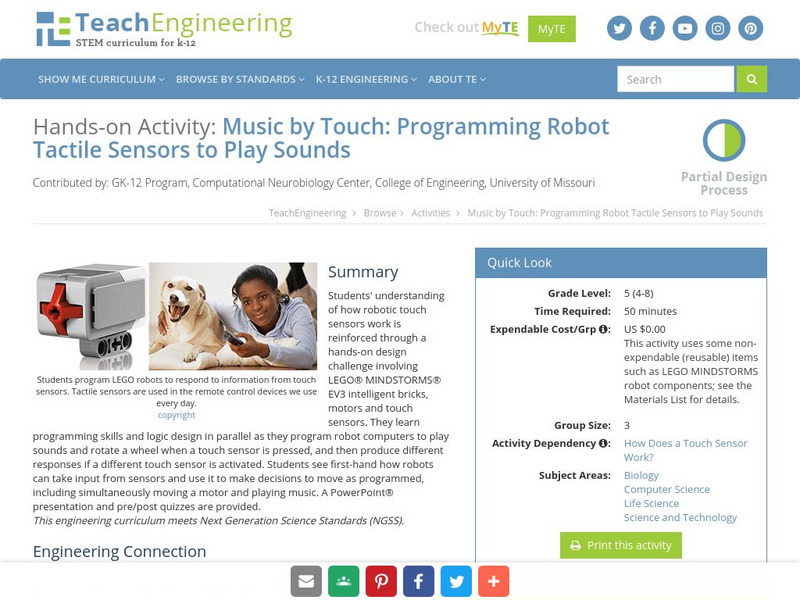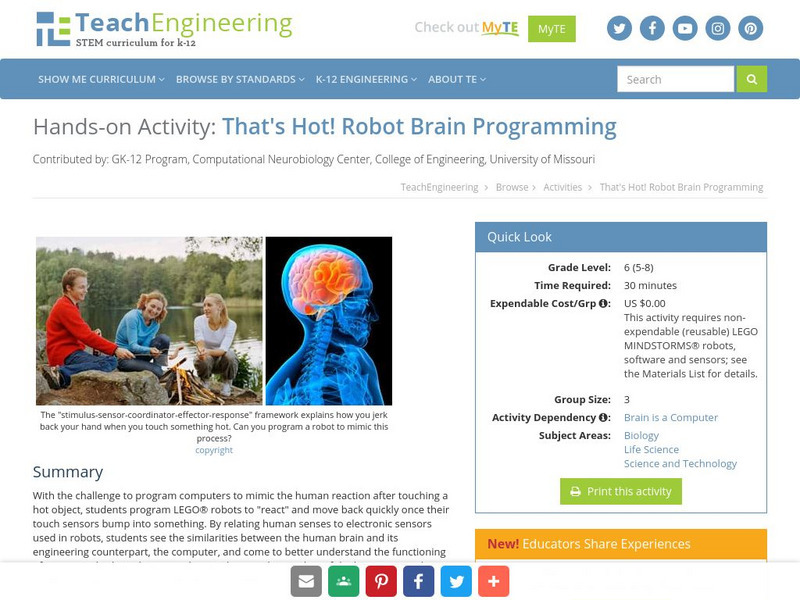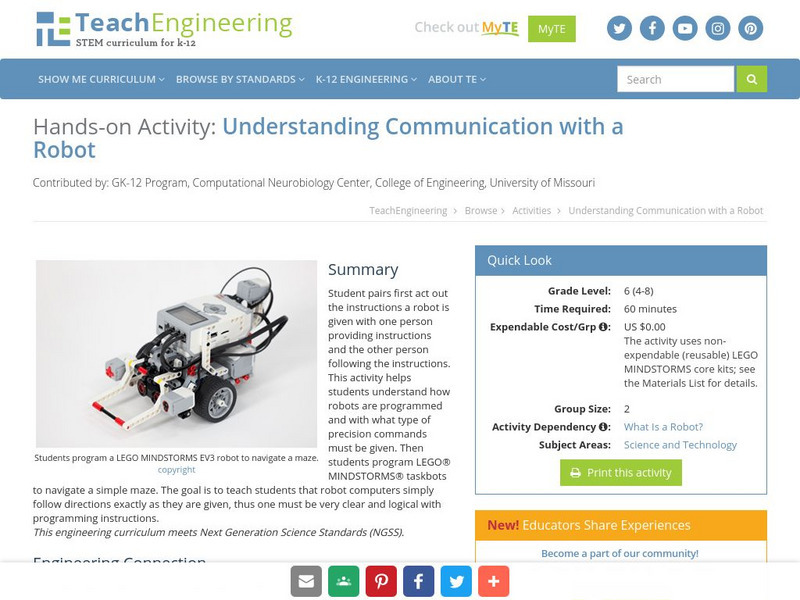TeachEngineering
Teach Engineering: Automatic Floor Cleaner Computer Program Challenge
Students learn more about assistive devices, specifically biomedical engineering applied to computer engineering concepts, with an engineering challenge to create an automatic floor cleaner computer program. Following the steps of the...
TeachEngineering
Teach Engineering: Computer Simulation of the Sonoran Desert Community
The computer program's simulation of a Sonoran desert community should ultimately strengthen the student's comprehension of what is required for a natural ecosystem to sustain itself (remain in balance). This computer simulation program...
Other
Business Education Resource Consortium: Computer Science & Information Systems
In this online manual you will find examples of integrated performance activities developed to coordinate with the Computer Science and Information Systems Career Path in the Business Education Career Path and Model Curriculum Standards....
TeachEngineering
Teach Engineering: Program Analysis Using App Inventor
In computer science, program analysis is used to determine the behavior of computer programs. Flow charts are an important tool for understanding how programs work by tracing control flow. Control flow is a graphical representation of...
Department of Defense
Do Dea: Spreadsheet Software Applications: M1: L1: Computer Essentials
In Module 1 Lesson 1 of this course, students are introduced to the basic functions of computer system components, to some technical vocabulary, and they will learn about computer security, privacy, and crimes. They will also learn how...
TeachEngineering
Teach Engineering: Our Bodies Have Computers and Sensors
Students learn about the human body's system components, specifically its sensory systems, nervous system and brain, while comparing them to robot system components, such as sensors and computers. The unit's life sciences-to-engineering...
TeachEngineering
Teach Engineering: Flow Charting App Inventor Tutorials
Students design and create flow charts for the MIT App Inventor tutorials in this computer science activity about program analysis. In program analysis, which is based on determining the behavior of computer programs, flow charts are an...
TeachEngineering
Teach Engineering: Using Waits, Loops and Switches
Students incorporate their knowledge of wait blocks, loops, and switches into their programming of the LEGO MINDSTORMS NXT robots to perform different tasks depending on input from a sound sensor and two touch sensors. This activity...
TeachEngineering
Teach Engineering: Studying Evolution With Digital Organisms
Students observe natural selection in action and investigate the underlying mechanism, including random mutation and differential fitness based on environmental characteristics. They do this through use of the free AVIDA-ED digital...
Other
Inspiration and Kidspiration: University of Wisconsin
This site features Kidspiration and Inspiration tools for active learning. Students and teachers will benefit from this comprehensive list of 50 different ways to use inspiration and kidspiration in the classroom and beyond.
Other
Word Processing Activity: Fbla Flyer 1
This site provides a student activity to allow learners the opportunity to develop and practice computer skills in a word processing program. Students are given instructions to use the computer to create a flyer.
TeachEngineering
Teach Engineering: Curiosity Killed the App
Students gain experience with the software/system design process, closely related to the engineering design process, to solve a problem. First, they learn about the Mars Curiosity rover and its mission, including the difficulties that...
TeachEngineering
Teach Engineering: Putting It All Together: Peripheral Vision
In this culminating activity of the unit, students bring together everything they've learned in order to write the code to solve the Grand Challenge. The code solution takes two images captured by robots and combines them to create an...
TeachEngineering
Teach Engineering: Android App Development
Students develop an app for an Android device that utilizes its built-in internal sensors, specifically the accelerometer. The goal of this activity is to teach programming design and skills using MIT's App Inventor software (free to...
TeachEngineering
Teach Engineering: Mars Rover App Creation
Based on their experience exploring the Mars rover Curiosity and learning about what engineers must go through to develop a vehicle like Curiosity, students create Android apps that can control LEGO MINDSTORMS NXT robots, simulating the...
TeachEngineering
Teach Engineering: Testing the Edges
Students gain experience using the software/systems (engineering) design process, specifically focusing on the testing phase. This problem-based learning activity uses the design process to solve open-ended challenges. In addition to...
TeachEngineering
Teach Engineering: Testing With J Unit
JUnit is a testing method that is included with NetBeans (Java) installs or can be downloaded from the web and included in the Java build. In this activity, students design tests for a provided Java class before the class methods are...
TeachEngineering
Teach Engineering: Simulating the Bug
Students modify a provided App Inventor code to design their own diseases. This serves as the evolution step in the software/systems design process. The activity is essentially a mini design cycle in which students are challenged to...
TeachEngineering
Teach Engineering: Evolving Tce Biodegraders
A hypothetical scenario is introduced in which the class is asked to apply their understanding of the forces that drive natural selection to prepare a proposal along with an environmental consulting company to help clean up an area near...
TeachEngineering
Teach Engineering: Hearing: How Do Our Ears Work?
Students learn about the anatomy of the ear and how the ears work as a sound sensor. Ear anatomy parts and structures are explained in detail, as well as how sound is transmitted mechanically and then electrically through them to the...
TeachEngineering
Teach Engineering: Music by Touch
Through a hands-on design challenge involving LEGO MINDSTORMS NXT robots, students learn programming skills and logic design as they program robot computers to play sounds and rotate a wheel when a touch sensor is pressed, and then...
TeachEngineering
Teach Engineering: That's Hot! Robot Brain Programming
With the challenge to program computers to mimic the human reaction after touching a hot object, students program LEGO robots to "react" and move back quickly once their touch sensors bump into something. By relating human senses to...
TeachEngineering
Teach Engineering: Engineering and the Periodic Table
Students learn about the periodic table and how pervasive the elements are in our daily lives. After reviewing the table organization and facts about the first 20 elements, they play an element identification game. They also learn that...
TeachEngineering
Teach Engineering: Understanding Communication With a Robot
Student pairs first act out the instructions a robot is given with one person providing instructions and the other person following the instructions. This activity helps students understand how a robot is programmed and with what type of...
